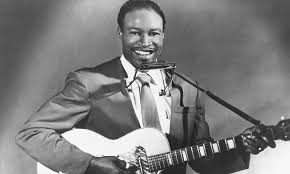Jimmy Reed – A Complete Biography
Introduction
Jimmy Reed (born Mathis James Reed) was one of the most influential and widely popular blues artists of the post-World War II era. With a laconic drawl, rolling boogie-shuffle grooves, and deceptively simple guitar-and-harmonica hooks, he bridged Southern juke joints and national pop charts—becoming a cornerstone for rock and R&B musicians who followed. His songs—“Honest I Do,” “Baby What You Want Me to Do,” “Bright Lights, Big City,” “Big Boss Man”—became standards recorded and performed by artists from the Rolling Stones to Elvis Presley.

Childhood
Reed was born on September 6, 1925, on the Shady Dell plantation near Dunleith, Mississippi. He grew up in a large sharecropping family, first sang spirituals at Pilgrim Rest Baptist Church in nearby Meltonia, and learned early harmonica and guitar. These Mississippi roots—rural rhythms and church-inflected phrasing—would stay audible in his later “country-into-city” Chicago sound.
Youth
Like many African Americans in the 1940s, Reed moved north during the Great Migration, settling first in Chicago, where he juggled factory work with street and club gigs, and then in the industrial corridor around Gary, Indiana. After a stint in the U.S. Navy during World War II, he returned to Chicago’s burgeoning electric-blues scene. A crucial reunion there with childhood friend Eddie Taylor—whose crisp, driving guitar became Reed’s rhythmic backbone—helped crystallize the sound that would make him famous.
Adulthood
Reed began recording for Chicago’s Vee-Jay Records in 1953. Backed by Eddie Taylor and often aided in the studio by his wife Mary (“Mama” Reed)—who co-wrote lyrics and, at times, cued him through takes—he developed a signature: mid-tempo shuffles, a steady “chank” guitar pattern, airy, simply phrased harmonica lines, and relaxed, “mush-mouth” vocals. This formula yielded a remarkable run of crossover hits throughout the late 1950s and early 1960s, placing him simultaneously on Billboard’s R&B and pop charts and making him a staple of college and theater tours.
Reed’s career, however, was complicated by alcoholism and undiagnosed epilepsy—conditions that sometimes derailed performances and sessions before doctors correctly identified his seizures. Even as health issues mounted, his influence grew; British Invasion and American rock musicians embraced his songs, and he toured Europe with U.S. blues caravans.
Major Compositions
Reed’s catalog is a masterclass in economy and feel. Among the most enduring are:
- “Honest I Do” (1957) – a plaintive shuffle that became a signature ballad.
- “You Don’t Have to Go” (1955) – his first national hit, announcing the Reed/Taylor groove.
- “Baby What You Want Me to Do” (1960) – a call-and-response blueprint covered by countless rock artists.
- “Bright Lights, Big City” (1961) – urban blues distilled into a pop-ready anthem.
- “Big Boss Man” (1961) – sly, swaggering complaint song that crossed over to mainstream audiences.
Death
Despite periods of recovery and occasional returns to touring in the 1970s, Reed’s health never fully stabilized. He died in Oakland, California, on August 29, 1976, while on tour. In the years that followed, his stature only grew: Blues Hall of Fame induction in 1980 and Rock & Roll Hall of Fame induction in 1991. He remains a touchstone for harmonica players, guitarists, and singers who prize feel over flash.
Conclusion
Jimmy Reed’s genius lay in refining the blues to its most singable, danceable essentials—creating a style “so perfect in conception and execution that it could never really be improved upon.” That blend of accessibility and authenticity helped the blues leap the color line and seeded generations of rock and soul. Whether heard on a dusty 45 or a stadium stage cover version, Reed’s shuffles still roll, his harmonica still sighs, and his songs still sound like the blueprint.

Comments are closed